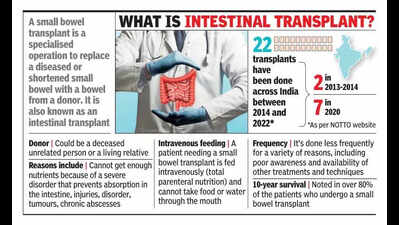- News
- City News
- mumbai News
- City’s 1st small bowel transplant of 2025 carried out
Trending
City’s 1st small bowel transplant of 2025 carried out
Mumbai: For about 75 days, 49-year-old Nashik resident Pravin Vispute could not eat a morsel or sip water. His gangrene-infected small intestine was removed, leading to him being fed using the total parenteral nutrition method, in which nutrients are directly delivered into the bloodstream through a vein.
Last week, he enjoyed his first normal meal after undergoing the city's first small bowel transplant this year at Nanavati Max Super Speciality Hospital, Juhu, on Feb 23. Around 30 small bowel transplants have been carried out across the country since 2013, but Vispute's surgery is different in that he received a donation of a 150-cm intestine from his wife, Jayshree. "Only three other intestinal transplant patients in Mumbai received a donation from a live donor," said transplant surgeon Dr Gaurav Chaubal. Usually, intestinal transplants are carried out from cadaveric donations.
Vispute, who worked in a company in Surat that manufactured glass vials for vaccines, started complaining of acute stomach-ache on Dec 21, 2024. His sister Kavita Sonar told TOI that he was immediately rushed to a hospital where doctors found that gangrene affected his small intestine entirely; he underwent surgery to remove the diseased part.
The family rushed back to their hometown in Nashik before they were referred to Dr Chaubal by the local doctors. "The patient was diagnosed with superior mesenteric artery thrombosis, a rare and life-threatening blockage of blood flow to the small bowel. The underlying cause was a congenital hypercoagulable state -- often due to deficiency in natural anti-clotting factors -- that can affect individuals at any age," said Dr Chaubal. As Jayshree was a good tissue match for her husband, doctors decided to conduct the transplant at the earliest. The family spent over Rs 25 lakh for the multiple operations, with the help of donations from well-wishers and friends.
End of Article
FOLLOW US ON SOCIAL MEDIA










